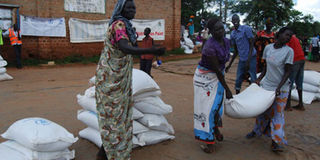Refugee crisis: Uganda washes its hands and becomes a donor

Refugee camp
It is significant that Uganda, recorded as one of the poor countries of the world, is a major safe haven and popular destination for refugees on the African continent.
Providing for 1.2 million people is no mean feat. Why, you may ask is a country, which is heavily dependent on foreign aid and can hardly provide basic health, education, nutrition, housing and employment for a big number of its citizenry, enthusiastic about helping refugees in the region?
On the face of it, Uganda is responding to a moral obligation, which is commendable. Since no one willingly leaves home to become a refugee, unless as one poet said, ‘home is the mouth of a shark,’ it would be very callous to turn such people away.
This scenario of a country ostensibly being more concerned about desperate neighbours than its own is replicated world over. For instance, many Africans who travel to developed countries like the US or those in the European Union; the major providers of aid to Africa, are shocked to find ‘white’ beggars, homeless people living rough on the streets and the unemployed holding placards, offering ‘to work for food.’ They can’t understand why a small fraction of the money donated to Africa is not saved for such people.
The answer lies in understanding power and hegemony. The reason why, say the US keeps donating money and helps countries when it fully knows that the money will be misused, lies in the quest for control. You pay the piper and call the tune. The recipient becomes beholden to you in one way or the other. There is nothing like free lunch. You get paid one day.
It is the same investment in the future that young American lives are sent and lost in battle fields in Afghanistan, Iraq, Pakistan and Syria. It is why they have expensively maintained military bases in South Korea, Japan and The Philippines. It is the same reason Ugandan boots are on the ground in Somalia, which is far away from Uganda. To have a sphere of influence is one of the aims of power for a leader and a country. In the case of Uganda and the question of refugees, the regime in Kampala scores on many fronts with this open door policy. First it defines the country as a peaceful and stable island in a turbulent sea.
The leadership of such a country then becomes an asset to the international community in helping to avert or in mitigating humanitarian crises.
It is the first point of call in case of trouble in the region. In an increasingly globalised world, this would be disruptive and injurious to the interests of international capital and the aid industry.
If, for instance, the victims of the tribal wars of attrition in South Sudan did not have an escape route into Uganda, you could easily end up with a genocide and total chaos because the victims have no option but to fight back for their survival. Such a country like has happened with Somalia, would not be in position to pay its debt and interest to donors. It would make the oil and gas extracted from there very expensive because of insecurity.
In the case of the DR Congo, relief offered by Uganda’s open door is momentous. The conflict there is mainly perpetuated by warlords with armed militias, in the provinces of this vast majorly lawless country, who grab land to extract the minerals underneath, thus displacing people.
Various reports have claimed that the blood diamonds, gold and other plundered minerals benefit merchants in Uganda, Rwanda, China, and many other firms in the Western world.
If Uganda, for instance, did not provide for the displaced, a lot of that business would be disrupted by wars that would erupt between the warlords and the displaced, who have no escape route.
The resultant bloodshed would alert the world media to focus more attention on the crisis in the DR Congo and probably disrupt the illegal trade in minerals. A report in 2008 in The Guardian claimed that about 45,000 people died every month from war, disease and starvation.
So by taking in those fleeing conflict, Uganda acts as a vital shock absorber in keeping the region peaceful. This inadvertently helps those who are benefiting from fishing in the troubled waters. It thus becomes of interest to them to keep the status quo of the leadership in Kampala. It is also cheaper for the international community to provide for settled refugees than engage in peace keeping if a country falls apart due to the displaced fighting those who displace them.
That is why those who rejoice when they hear that the West is unhappy about governance in Kampala always end up disappointed. The Kampala leadership is an asset that cannot be easily dispensed with simply because of a bad election, corruption or human rights abuses.
Its accommodation of refugees is a form of the much needed aid that one would equate with the school fees a poor student pays in kind to sit in the same class with the one who pays in cash.
Nicholas Sengoba is a commentator on political and social issues. [email protected]
Twitter: @nsengoba


